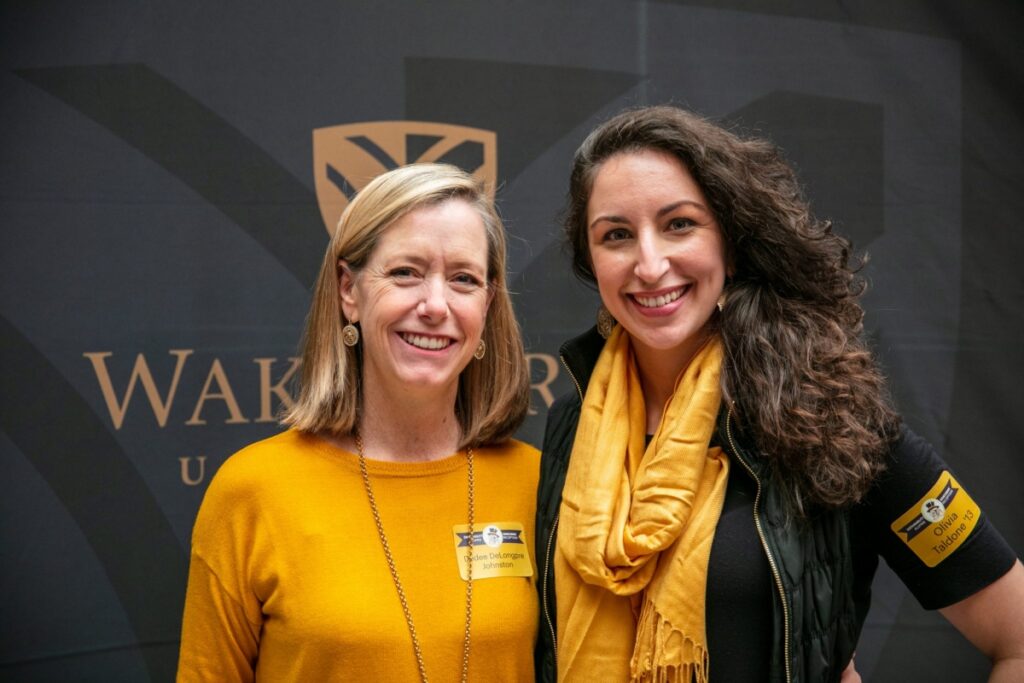Where are they now? Olivia Taldone (’13)

By: Caroline Walker (’22), Graphic Design Assistant with the Office of Sustainability
Olivia Taldone graduated from Wake Forest University in 2013 with a Bachelor of Science in biology and minors in economics and environmental science. She earned her Master’s of Science in green technologies and engineering at the University of Southern California. She now works as the Northwest Regional Account Manager of Powerwall Certified Installers at Tesla.
You majored in biology and double-minored in economics and environmental science. Why did you decide to pursue that track?
I decided to pursue that track, because when I arrived Dedee [DeLongpre Johnston, Chief Sustainability Officer at Wake Forest] had just arrived and just come to Wake Forest as well. There was no real Office of Sustainability until Dedee arrived. I spent my freshman year and sophomore year trying to talk to the right people. She wanted to grow the Office of Sustainability, but that’s different from the courses. So, I was instructed by different professors saying that, well, if you take the biology route, you have so many paths, and if you do a double minor in environmental science and economics, that should give you a holistic view of how to work with the environment. I knew from high school that I wanted to go into some renewable energy path or help the environment. As we all know, science only helps so much — unless there’s an economic benefit and understanding of how that works, people won’t adopt it. That’s why I went into what I did for undergrad.
What would you say is most applicable to your job now?
In general from Wake Forest, the work ethic. I would say that the professors always had such high expectations and always made us have projects that had some sort of application to the real world. They all required critical thinking and those are skills that I apply to my job. I think that helps a lot with my work. I’m in charter management and sales, so I think understanding and knowing how to speak all the sides of it is important, because you have to speak the economic language and you also have to speak the science language. My biology background definitely helped me with my job because I know the science and I know the strategies and how to think about experiments, do reports, and be able to communicate scientific information successfully to people in the solar and energy storage world.
How do you view your position now in terms of sustainability?
I think it’s really great that I’m in the job that I am. My whole goal throughout Wake Forest was to be able to end up in a place with the mission to enhance the sustainability for the world. Tesla’s mission is that exact thing — to accelerate the world’s transition to sustainable energy. I am a channel partner manager, so I manage our contractors across the pacific northwest who procure our battery energy storage products from us and then resell it to their customers. I feel like I directly help the environment, because I’m helping people sell solar and be able to utilize energy from the solar panels and then store it in the batteries. Not only are the customers having a better life because they have backup power in case something happens where the utility shuts off their power or there is a storm, but they are also saving more money by having the utilization to discharge and charge onto the grid during cheaper times. They not only have solar savings, but they have battery savings. I feel like it’s pretty applicable to helping people in a sustainable way.
Wake Forest is working to develop a new major in environment and sustainability. What advice would you give to students who are considering this course of study or other paths in sustainable studies?
That is awesome. I would say if they want to get into the renewable field, I would strongly suggest that they take that [environmental science] major. I wish that I had that going to Wake Forest, because I had to make my own path and struggle to know what courses to take and what majors to do. It sounds perfect with the interdisciplinary focus, because what I ended up having to do to get my foot in the door was go to a master’s program and get an interdisciplinary degree in green technology and engineering. Wake Forest’s platform was great, because it let me take all the sciences and maths that I needed to get into that master’s program. But if people can take these classes, they may not have to get a master’s in order to get into the renewable energy field.
